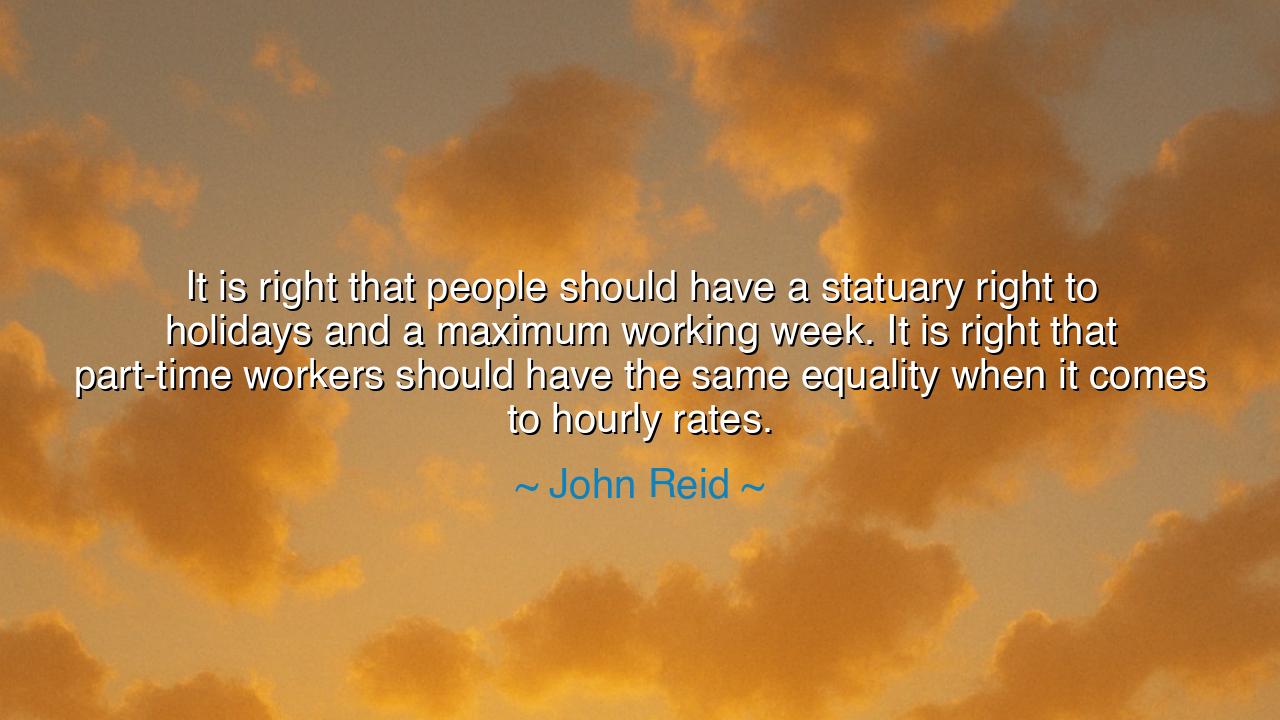
It is right that people should have a statuary right to holidays
It is right that people should have a statuary right to holidays and a maximum working week. It is right that part-time workers should have the same equality when it comes to hourly rates.






In the steadfast words of John Reid, a statesman who served in the crucible of labor and government, we hear the echo of a timeless moral truth: “It is right that people should have a statutory right to holidays and a maximum working week. It is right that part-time workers should have the same equality when it comes to hourly rates.” These are not the idle musings of policy, but the affirmation of human dignity. Beneath his words lies the conviction that labor—the sweat of human hands and the endurance of the spirit—must be balanced by justice and rest. Reid speaks as one who understands that equality is not charity, but the rightful inheritance of all who labor under the sun.
The origin of this quote can be traced to the heart of the British labor movement and the long struggle for workers’ rights—a struggle that stretches back through centuries of toil and awakening. As a minister in the United Kingdom’s Labour government, Reid stood within a tradition that sought to elevate the working man and woman, ensuring that prosperity was not confined to the few but shared by the many. His call for statutory holidays, a maximum working week, and fair wages for part-time workers was not mere reform—it was the continuation of a moral revolution. He was declaring that human beings were not machines of endless production, but souls worthy of rest, balance, and respect.
The ancients, too, knew the sanctity of labor and the peril of overwork. In the Mosaic Law, even the Creator Himself set an example: six days of creation, and one of rest. The Sabbath was not only divine ordinance but social justice—a day when the poor, the stranger, and even the beast of burden could breathe. This ancient rhythm of work and rest was a recognition of the limits of flesh and spirit. To deny rest is to deny humanity itself. Reid’s words draw from this same eternal wisdom: that no economy, no empire, no ambition can justify the exploitation of human strength beyond its natural bounds.
Consider the tale of the Industrial Revolution, when men, women, and children labored fourteen, sometimes sixteen hours a day amid smoke and hunger. The wheels of progress turned, but beneath them, countless lives were crushed. Yet from that darkness rose voices of light—reformers like Robert Owen and Lord Shaftesbury, who demanded humane conditions, limited hours, and the right to rest. Their efforts gave birth to the early labor laws and the concept of the eight-hour day, a triumph purchased through suffering. When Reid speaks of statutory rights, he invokes the memory of these battles hard won, reminding us that the comforts we take for granted were built upon the courage of those who dared to demand fairness.
To declare that part-time workers deserve equal hourly pay is to strike against one of the most persistent injustices of modern economies: the quiet devaluation of those whose contributions are unseen or deemed small. But every hour of honest work bears the same worth before the measure of justice. Whether one tills a field or types at a desk, whether one serves for forty hours or ten, the labor of each carries dignity. Reid’s words demand that we see beyond numbers and contracts to the sacred equality of labor—that all who serve society deserve recognition without hierarchy of hours.
And yet, there is more than law in his message—there is morality. For a society that denies rest denies its own soul. A world that measures worth only by productivity forgets the purpose of human life. Rest is not laziness—it is restoration. Fair pay is not indulgence—it is righteousness. When the powerful defend the rights of the working, they honor not only the individual but the order of creation itself. For justice among workers is the seedbed of peace; it is the soil from which loyalty, community, and progress grow.
The lesson, then, is clear: to build a just world, we must cherish both labor and leisure, both the work of the hands and the quiet of the heart. Each must balance the other as day balances night. Support those who toil beside you. Defend the rights of those whose labor sustains the common good, whether in factories, farms, offices, or homes. Demand that equality not be spoken as an ideal but enacted as law. For when we protect the dignity of work, we protect the dignity of humankind.
Thus, let the spirit of John Reid’s words endure as a guiding flame for all generations: that the worth of a person is not measured by hours worked, but by the life lived within those hours; that justice demands not ceaseless effort, but fair rest; and that true greatness in a society is found not in the wealth it amasses, but in how it honors the hands that built it.






AAdministratorAdministrator
Welcome, honored guests. Please leave a comment, we will respond soon